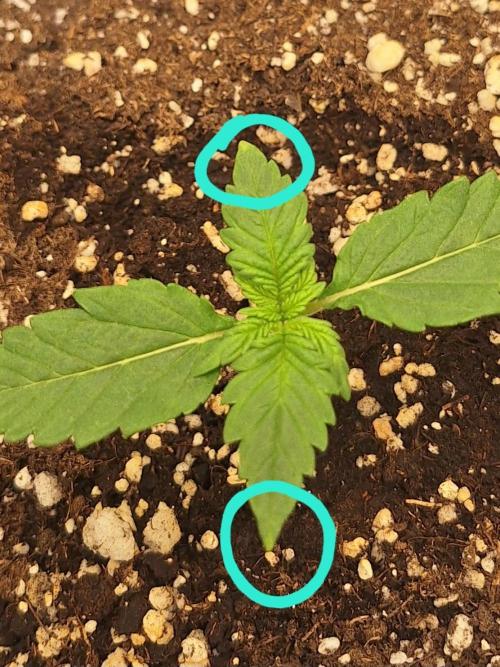The Grow Awards 2026 🏆 





















2/3 plants show weird leafs. All are fed from the same water. 2 different issues. Anybody know what this is?
Ibanheadstarted grow question 4y ago
Back plant has discolored leafs, lighter appearance and darkbrown spots on the leafs. The front left plant has dead/yellow/dried spots in the middle of healthy looking leafs. Any ideas what this is? I can add more pictures if needed.
likes
Answer
Cloyyanswered grow question 4y ago
Looks like a magnesium deficiency, coupled with some leaf contact issues and maybe a PH issue, since the nitro they need is a mobile nutrient. Nothing crazy, easy fixes!
likes
Complain
Foffukuntzanswered grow question 4y ago
First 2 pictures static leaf contact and moisture build up between them.
A lot is humidity VPD problem caused by much plant small area and environmental issues day/night.
You need dehumidifier exhausting near the air intake not AC!
In tent would be no use as extraction will usually clear the tent of air before AC/dehumidifier can have an effect.
Dri eaz cube was my solution,but not cheap, you can tool hire one even 😄 I bought one second hand from a pawn shop, no more RH probs, not cheap to run at 1.5kw max but better than tossing bud.
Had bud rot, gutting, unsmokeable too.
likes
Complain
NobodysBudsanswered grow question 4y ago
the twisting of leaves denotes some ph swings. this happens due to varying rates of gowth over time caused by ph swinging too much.
looks like coinciding symptoms of potentially different causes... could be pH or improper ratio of nute concentrations causing some lockout too.
need more info for a solid answer...
i see you have been feeding terrabloom the last three weeks and before ethat had a little tip burn on leaves. that could be more than 1 cause too... anyway, go check out manic botanix nutrient calculater and see what your terrabloom is providing in a more resolved way... more likely to recognize if something si too high o too low than just guessing about it or learning slowly from trial and error.
it's been a bit imbalanced the whole time, so it's difficult to know for certain what the cause is.
something was stated that is not correct:
"Plants are eating all the potassium and phosphorus making your ph rise, " -- does not work this way.... the plant in no way actively selects what it takes in... if it fits through the permeable membrane of roots, it will be taken in. Whatever is in solution that fits through, will be "drunk".
how ph can be impacted baed on facts:
if not fully chelated or fixated nutes, what gets left behind could cause a fluctuation (one more reason to avoid 'organic'). this is from feeding too much or a rhisopshere that cannot properly process the given molecules into plant useable 'food' fast enough... or need lower concentration in feeding regimen.. depends.
microbes can cause pH to rise by absorbing things, causing chemical changes and evacuating byproducts that are now acidic. not much you can do about this... beneficial microbes often keep this in check through competition for resources. h2o2 drench and re-inoculate but probably going to set oyu back.. and if in flower, may be better not to bother.
evaporation will cause pH to rise because pH is calculated from ratio of proton donators or acceptors in a specific volume of water... reduce the volue of water and you increase the molarity (i.e. higher concentrationsn or h3o+ or oh- floating around in a smaller volume)
what we add can change pH...
nothing else magically changes pH without real cause and effect. the plant has no central nervous system. it doesn't think. it doens't make decisions. it is not a picky eater in any sense. it merely reacts to environment in a very compartmentalized way based on exposure.
while what was said is could be right, if the cause and effect is explained poorly, it'll inevitably lead to bad assumptions in future.
2 likes
Complain
Chow_13answered grow question 4y ago
First 2 pictures - unknown
Third Picture im gonna guess nitrogen deficiency ( or in a highly unlikely chance Mosaic virus )
Last 3 pictures are a magnesium deficiency/lockout. <- From either PH out of range, To much food causing lockout or an actual deficiency.
likes
Complain
Robertsanswered grow question 4y ago
You have ph issues in substrate showing 3 different deficiencies. Plants are eating all the potassium and phosphorus making your ph rise, or your are not getting aquate run off when you feed and you have salt build up causing ph to spike down. You likely know which it is.
likes
Complain
Similar Grow Questions
Solved

BunnyBud
Day 8 | BPP Auto – Small Spots on True Leaves (183 ppm, SF1000D 45cm)Day 8 (week 2) Banana Purple Punch Auto (FastBuds). Small spots on first true leaves. Used Madman method: only pH water until last night (0.2ml/L Biobizz Fish Mix, pH 6, 183 ppm). Temp 26–29°C, RH 60–70%, SF1000D @45cm. Sprayed twice 10min before lights on. Cause? 
Leaves. Color - Yellow
Leaves. Color - Pale
6mo ago
2
2
Solved

Togoutouseg
Feuilles jaune et marron!Bonjour, j'aurai voulu savoir si vous saviez ce qui arrive à me plantes. Une d'entre elle se décolore, elle perds son vert qui jaunis. Et l'autre à beaucoup de mal à pousser, et ses pointes deviennent marron. Les feuilles se lève aussi.
Merci beaucoup pour votre réponse.
Leaves. Color - Yellow
Leaves. Color - Pale
Leaves. Color - Dark-brown
3y ago
1
3
Solved

GolfandWeed
Blueberry with yellowing leaves and burn tipsFan leaves starting to yellow and seeing some tip burn on this blueberry It’s about 18-20 day into flower. I am growing in soil using organic dry amendments. She was fed 4-4-4 DTE 3.5 weeks ago and 4-8-4 DTE 4 days ago along with a high P tea. Always fed with water of ph 6.5.
Leaves. Color - Yellow
4y ago
1
Solved

vzkzz
Why is my plant yellow at the top?Seed: Royal Jack from RQS 8 weeks from seed(4th week of flower)
Medium: BioBizz Lightmix
Nutrients: Half of recommended BioBizz dosis
Bio-Grow
Bio-Bloom
Top-Max
Bio-Heaven
Acti-Vera
Calmag
Watering with 4 Liter water and nutes every 2-3 day.
Run-off ph 6.6 1260 ppm
45DLI
Leaves. Color - Yellow
2y ago
4
Solved

JustAnotherGardener
High TDS and low ph runoff - Lockout? deficiency?Struggling with some bad soil (beginners mistake). I water with dechlorinated tap water at around ph 7.4 and 400ppm (not feeding yet). But runoff ph is 6 and around 1000 ppm.
Am I dealing with a N-lockout? why such a ph difference and high TDS value?
Leaves. Color - Yellow
Feeding. Deficiences
5y ago
4
5
Solved

renbuds
Sligthtly Yellow LeavesI'm growing 2 Mephisto Canna Cheese seeds. Canna #1 is looking very healthy and green. Canna #2 is healthy (ish) but its branches are more spread out and the leaves are a bit yellow green. I'm trying to figure out if I have a problem with Canna #2 before it gets worse.
Week 3
Leaves. Color - Yellow
1y ago
1
8
Solved

JinksyGrows
Alright peeps, here's one for you. Still don't know what it is. Pictures attached to Week 9, Veg.
This has been occurring since week 3. There has been NO spread, it is always localized to only 1-2 leaf blades and she is not stunted at all (largest girl). Please PM for more info6y ago
2
1
Solved

fiatchd
Leaf problemsI think I did use too much fertilizers, whats happening here?
https://growdiaries.com/diaries/180523-grow-journal-by-fiatchd
Leaves. Color - Yellow
Leaves. Color - Dark-brown
Feeding. Deficiences
2y ago
2
5
Solved

Untiedmymind
Leaves turning yellowLeaves yellowing need a little help.
Week 14
Leaves. Color - Yellow
5y ago
2
1
Solved

CoronaGrower
2 Yellowing Fan LeavesI have 2 large fan leaves from the main cola turning yellow and 1 almost looks crisp or burnt on the edges.
It is only 2 of the leaves and by my reckoning, they are 2 of the oldest leaves on the plant.
From research, it could be the bump in nutes or water issue.
Any ideas?
5y ago
1
1
Solved

romi27
Burnt edges / yellowingWhat are all these burnt edges from? One of the burnt leaves is from the perimeter, so I'm not sure how it could be receiving enough light to burn. I also have a small amount of yellowing towards the bottom. That's normal during flowering if the low-light leaves die, right? Thx5y ago
1
2
Solved

Anoo222
First grow, calcium deficiency?First grow, help please.
As seen on the pictures provided, the leaves are getting brown spots on them with some kind of yellowing. I also do have some yellowing tips. I do suspect a calcium def. after some reading but would highly appreciate the input of a more experienced grower
Leaves. Color - Yellow
5y ago
4
6

























